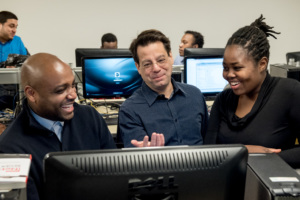Amplifying Hispanic Perspectives in Technology Through Strategic Partnerships
We celebrate Hispanic Heritage Month annually from September 15 – October 15, but diversifying the tech landscape to include more Hispanic and Latinx perspectives and presence is something Per Scholas keeps in mind throughout the year. With partners, including TEKsystems, we have connected nearly 1,500 Hispanic learners with technology careers in a field in which they are typically not represented.
At Per Scholas, Hispanic technologists comprise 17% of our learners, while they make up just 15% of the technology workforce. This is a statistic we are constantly working to increase as part of our mission to create economic equity and representative diversity in the tech workforce. Achieving such a vision requires strong collaboration with partners who are similarly committed to our goal.
TEKsystems has been our partner for nearly a decade and is committed to nurturing an inclusive workplace culture and welcoming diversity in technology from the inside out. TEKsystems recognizes the contributions of Hispanics in the workforce and celebrated Hispanic Heritage Month through powerful stories from their team. Leaders from TEKsystems’ Employee Network, AdelanTEK, reflected on how fostering an inclusive culture in the workplace inspires authenticity and results in individual success, both personally and professionally. Additionally, TEKsystems Recruiter Lead Magdaleny Soberanis-Depaz shared how her upbringing as a Latina has shaped her career and the impact diversity has in the workplace “Growing up in a multicultural community and learning from people of all walks of life has given me a perspective that is an advantage over most,” Magdeleny reflected. “Diversity is truly a strength. Because I am a person of color and in a leadership position, I’m able to bring different perspectives, opinions, and ideas around problem-solving and solutions, ultimately creating a bigger impact on my team and peers within the office, as well as outside of the office.”
Per Scholas and TEKsystems share the same mission and belief that diversifying the tech workforce will bring innovation and powerful insight to the industry. These perspectives are shared by Per Scholas President and CEO Plinio Ayala, who is passionate about working with companies whose mission aligns with Per Scholas. Plinio grew up in a close-knit neighborhood in the South Bronx that contained many diverse Hispanic communities, including Puerto Ricans, Mexicans, Dominicans, Hondurans, and more. Thus, Per Scholas’s mission is important to him and his Hispanic heritage on a personal level. Plinio’s story resonates internally at Per Scholas and translates to the learners we interact with as we train them for various technology roles.
“Being Hispanic and leading an organization rooted in diversity and inclusion, I’m inspired by my colleagues who feel like they can be their authentic selves and bring their culture and identity into their work,” Plinio reflects. “Having different backgrounds and using our unique experiences to create new and innovative ideas in tech gives me hope for the future of technology. We have come so far at Per Scholas to bring more Hispanics into technology, but there is still room for growth. I hope to hear of more C-suite leaders of Hispanic background in tech in the next year, which is possible with training and partnering with companies, including TEKsystems, who share the same mission.”
We’re proud to celebrate Hispanic Heritage Month and elevate Latinx voices and experiences throughout the year, especially with partners, including TEKsystems, that create an inclusive workplace culture and welcome diversity in technology from the inside out.
Pioneering Cybersecurity Diversity with Per Scholas Diverse by Design
Pioneering Cybersecurity Diversity with Per Scholas Diverse by Design
With Cybersecurity Awareness Month coming to a close, there’s no better time to discuss the vital need for diversifying the cybersecurity workforce, the potential consequences for technology industry leaders not addressing this issue, and the multifaceted approach that Per Scholas is adopting to break down barriers for underrepresented talent. At Per Scholas, we’re providing tech talent solutions with tailored training for organizations and upskilling opportunities for technologists.
Cybersecurity Demands Innovation & Diversity
In the ever-evolving realm of the technology industry, the role of cybersecurity as a guardian of our digital assets and infrastructure cannot be overstated. However, we face a challenge that has become too familiar – the absence of diversity within the cybersecurity workforce. An article from Forbes states, ” The International Consortium of Minority Cybersecurity Professionals (ICMCP) points out women are barely 14% of the information security ranks, while women make up 51% of the U.S. population. The U.S. Labor Department says African Americans make up a scant 3% of information security analysts in the U.S. today.”
Technology requires innovation. Without technology, we would suddenly find ourselves in a state of crisis because our quality of life relies heavily on it – our days start with technology literally at our fingertips. Diverse workforces lead to better innovation that stands as the cornerstone keeping organizations competitive, forward-thinking problem solvers. Cybersecurity, a critical component of technology, should be no exception to diversity. The lack of diversity, particularly concerning gender and ethnicity within the cybersecurity workforce, poses a challenge to innovation.
Diversity brings a host of benefits. It ushers in fresh perspectives and insights that are vital for comprehensive risk assessment, robust security strategies, and responses to emerging threats. In a continuously evolving cybersecurity environment, diverse teams possess the adaptability and expertise required to tackle these challenges adeptly. Diverse cybersecurity teams are specially positioned to detect and address biases in security systems and algorithms, ensuring the integrity and fairness of our cybersecurity measures. Within the technology sector, the demand for cybersecurity professionals has grown exponentially. Organizations must broaden recruitment efforts to encompass underrepresented groups, enabling the industry to tackle this scarcity and foster economic growth and innovation. This strategic shift also empowers organizations with the invaluable opportunity to tap into the potential of individuals who are traditionally overlooked.
Paving the Way for Diverse Cybersecurity Technologists
At Per Scholas, we understand that underrepresented talent often encounter barriers to entry into the cybersecurity field, and we have taken proactive measures to combat these challenges. For more than 25 years, Per Scholas has been unlocking potential for individuals, communities, and employers through rigorous training for careers in tech, including cybersecurity.
We offer free technology workforce development programs, removing the financial constraints that many talented individuals from underrepresented groups face, and actively facilitate connections, mentorships, and networking opportunities to help participants bridge the gap in professional networks, a crucial element in securing employment.
Per Scholas Diverse by Design specifically promotes a culture of inclusivity and actively combats unconscious biases within the tech sector by championing diversity and inclusion as part of our core values. Per Scholas Enterprise Solutions also recognizes the significance of upskilling existing talent and providing tailored training for organizations and offers customized training solutions to equip organizations with the skills and knowledge necessary to navigate the evolving threat landscape effectively with partner organizations committed to building a diverse workforce.
Advancing Equity to Increase Opportunities in Cybersecurity
Now is the time to diversify the technology industry, where innovation and security are pivotal to success, and the need for diversity in the cybersecurity workforce is not up for debate. As technology industry leaders, we bear a unique responsibility to champion diversity, equity, and inclusion opportunities within our ranks. Per Scholas is partnering with CGI, a Global IT and business consulting firm, to address this challenge and provide sustainable solutions. We have curated a customized invite-only event along with CGI dedicated to diversity in the cybersecurity industry entitled “Advancing Equity to Increase Opportunities in Cybersecurity.” This event will bring awareness to the challenges of starting a career in cybersecurity and how to develop strategies to increase access and representation.
Increasing Opportunity Through Increased Accessibility
Having reliable access to WiFi, computers, and other resources is critical to success in technology training courses like ours. For more than 25 years, Per Scholas has been providing opportunities for individuals to launch thriving tech careers with our tuition-free tech training. We have found new ways to increase workforce equity for our learners and have given them the materials needed to succeed in their training; however, there is still room for improvement in addressing accessibility. The good news is that there are programs available for learners to get access to the Internet, transportation, and computers and laptops in order to complete our training and launch their tech careers.
Resources such as the FCC’s Affordable Connectivity Program (ACP) assist those eligible with obtaining Broadband Internet access nationwide and are available to our learners as they embark on the college admissions process and Per Scholas training. The direct benefit of this program is that it’s helping to bridge the gap between opportunity and accessibility – as it should not be obstructed by lack of resources. This program is further bolstered by the work of one of our partners, Comcast, to close the digital divide.
In the first six months of 2023 alone, we’ve discovered that nearly 100 of our enrolled learners needed help with getting Internet access. Given this data, we can only imagine how many more applicants have been impacted due to a lack of Internet access including those applying to Per Scholas training. With the FCC’s Affordable Connectivity Program, potential learners can acquire the resources needed to launch a thriving career in tech.
The benefit program, ACP, provides up to $30 per month or $75 in Tribal areas toward Internet service. When combined with Comcast’s Internet Essentials or Internet Essentials+ service tiers, it makes home broadband effectively free.
A household is eligible for the Affordable Connectivity Program if the household income is at or below 200% of the Federal Poverty Guidelines, or if a member of the household has received a Pell Grant, participates in Federal Assistance programs like SNAP or Medicaid, or meets the eligibility criteria for the Internet provider’s existing low-income Internet program.
To learn more and how to apply, visit the federal government’s website or contact an Internet service provider in your area.
Comcast NBCUniversal has been a partner of Per Scholas since 2021 and invested in Per Scholas to help individuals build the skills they need for successful careers in technology.
Through this partnership, Per Scholas will prepare more than 10,000 diverse adults for careers in tech across at least 15 Comcast markets over the next three years. Comcast is also providing Internet access for individuals who need connectivity, providing a way for learners to use our training remotely and for potential learners to apply to our program.
Per Scholas doesn’t want accessibility to stop learners or potential learners from launching their tech careers. The good news is now there are programs and initiatives that will increase accessibility for all learners, thus increasing opportunities for them in the tech sector as well.
To learn more about courses offered at a Per Scholas campus near you, click here.
Learn more about the FCC’s Affordable Connectivity Program here.
How to Start Your IT Career: 7 Step Guide

In a time when the job market is uncertain, one thing remains constant – IT roles are evolving and available. The IT industry is rapidly growing, and there is a high demand for skilled professionals in various domains such as software development, cybersecurity, data analytics, tech support, and more.
With a wide range of career paths and opportunities, starting an IT career can be an attractive option for those looking to switch careers or enter a field with strong job prospects.
However, starting an IT career can be challenging without a clear understanding of the industry and the skills required to succeed.
In this article, we’ll provide a step-by-step guide on how to start your IT career. Even if you come from a different industry background.
How to Start Your IT Career: 7 Steps
Here’s our 7 step guide to starting your IT Career:
1. Research Different Tech Industry Careers
If you find yourself not knowing where to begin when it comes to starting a career in IT, you can start by doing some research. A quick browse for everything from entry-level IT jobs to tech industry careers will not only help you determine what route you’d like to take, but on a broader scale, it will also show you the many different paths you can take in tech. The possibilities for a career in IT are endless and it all starts with jumping in head-first.
The IT industry has various domains; from cybersecurity to help desk, each entailing its own specializations and avenues to go down in your IT career. Additionally, each domain has certain certifications that are helpful when entering that field.
There are many different career paths in the IT industry with different skills requirements and certifications. Here are a few that have proven to be successful:
- Cybersecurity: This is an important IT career path lately as hacking and information security has been a topic of interest throughout different industries. No matter what industry or company you are interested in, chances are there are open positions with cybersecurity. Successful cybersecurity careers entail various certifications such as Net+ and are often more advanced with qualifications.
- Software Engineering: This could involve project management and product development in any industry, making it a great path to get into for an IT career. With different skill levels to enter and advance to, this is an ideal career to go into for career advancement.
- Desktop Support: Desktop support careers are often a stepping stone for advancing in tech and especially to get experience in technology.
2. Develop your IT skills and Knowledge
Online, there are different options to develop IT skills. Research will reveal that you can self-learn, take part in online bootcamps or start programs for certifications. Choosing the right IT training program that matches your style of learning and Per Scholas offers courses remotely and in-person for IT training, and there are many ways to develop your IT technical skills through a learning resource that works best for you. Most impportantly, we recommend that you receive hands-on experience through bootcamp courses, training, and studying for your certifications. It’s important to have that hands-on training experience since it gives your more experience than what you may read in a book or watch on a video. Additionally, it puts your experience and knowledge ahead of others who are entering the IT industry.
3. Apply for our Systems Support Training
With so many options available, we believe one of the most crucial steps to starting a career in IT is to engage in a training program.
We recommend starting with our IT Support training or Desktop Support training, powered by TEKsystems. These courses, in particular, are great for getting your foot in the door in tech and learning IT fundamentals. No matter your previous experience in tech, Per Scholas makes sure you are caught up to speed and have the skills needed to launch your career in tech to land in one of the many IT roles available – as with any of our courses.
If you’re still not sure which program is right for you, we suggest you Contact our Recruitment Team with your interest. We are happy to help answer any questions you may have as you launch your career in tech. Together, we can figure out how to get you started at one of our IT training campuses.
4. Get Certified For A Career In IT
An IT certification doesn’t just look good on your resume; it helps translate your training and skills into real-life applications whichever tech career you choose to take on.
Per Scholas not only prepares learners for certifications and an IT career path, but we provide tuition-free training and pay for certifications under the completed course. With certifications and your tech skills, we know you will have the tools to start your IT career.
5. Network with Top Tech Industry Professionals
Networking does not get enough credit when it comes to its impact on launching your career in the tech industry. In a time where it’s not just what you know but who you know that matters, networking is key to a career change or next step.
We suggest networking with industry leaders in a position you aspire to be in and picking their brains on different IT roles, opportunities, and what they did to get where they are in their careers.
At Per Scholas, we connect our learners with tech industry professionals through mock interviews, company partnerships, and other professional development opportunities to ensure our learners have the chance to speak to others in the industry.
When it comes to discovering just how to start an IT career, Per Scholas possesses a wealth of resources for you to use to your best advantage.
6. Create your IT resume and portfolio
When creating your resume geared for an IT position, it is important that the content you provide is relevant to the job and showcases your technical skills as well as your soft essential skills. If you are far enough into your career to have a portfolio, include relevant information and items in that for interviewers and recruiters to review. What would you want to showcase from your past work and experience that sets you apart from other technologists?
7. Apply for IT jobs
Once you have the training, certifications, and resume, it’s time to take action and apply for IT jobs. There are a few ways to find IT job opportunities, including job boards, career fairs, and networking. Per Scholas connects our learners with hiring partners to discuss open positions and further network with industry experts. In applying and preparing for IT job interviews, be sure to research the company and the position you’re applying for, and practice common interview questions with responses that highlight your experience and strengths.
The interview process doesn’t stop once you are done interviewing. Be sure to follow up with the hiring manager, recruiter, and/or your interviewer to thank them for their consideration and to let them know about your excitement for the role.
Start Your Career in IT Today
It takes time and effort to launch a career in tech – no matter your background in IT. Making a career change or starting fresh in a new industry is a big deal that takes a lot of consideration, but with the right tools, training, and IT fundamentals, taking that first step towards one of many IT roles isn’t so daunting.
To get started on your own IT career, be sure to apply to one of our upcoming courses that have launched a career in IT for more than 20,000 learners trained, now leaders in the IT career field.
Advancing Hispanic and Latinx Presence in Tech
THE STATE OF DIVERSITY & INCLUSION IN TECH
Although there have been advancements over the years in the diversity of the tech field, the broad field of technology is still heavily dominated by white men, and now is a good time to celebrate the many accomplishments of our Hispanic and Latinx co-workers and learners while reflecting on the state of diversity in tech. Black, female, Latino/a, and other minorities remain greatly underrepresented throughout the tech industry.
In recent years, more emphasis has been put nationally on the importance of promoting diversity, equity, inclusion, and belonging (DEIB) in the workplace, but the tech industry still has a long way to go in becoming a more equitable workforce.
- For example, in 2014, Google, a subsidiary of one of the world’s largest tech companies, reported that only 2.9% of their employees were Latino/a.
- Google promised to commit over $150 million to increasing diversity at their company but, by 2020, just 5.9% of their workforce identified as Latino/a, a definite improvement, but nowhere near representative of the U.S. population.
- According to a 2021 analysis of federal government data by the Pew Research Center, Hispanic workers make up 17% of total employment across all occupations, but make up just 8% of tech workers.

WHY DIVERSITY, EQUITY, AND INCLUSION MATTERS
Currently, there are a myriad of barriers for minority individuals looking to enter the tech workforce. In addition to the bias and discrimination towards certain minorities that still, unfortunately, exist in a disproportionately high amount in the STEM fields, lack of access to opportunity and specified support within the tech field, our country’s digital divide, racial wage gaps, poverty, systemic inequalities, and even disparities in reliable internet access, are all barriers to entry for potentially talented individuals seeking to become involved in tech.
Creating pathways for more diverse talent to get involved in tech is the first step in building a diverse workforce. While tech training programs and bootcamps can help alleviate some barriers into the tech field by costing less and being quicker than the typical four-year degree, many are still prohibitively expensive and do not adequately target underrepresented groups for recruitment.
CELEBRATING HISPANIC HERITAGE
Each year, Per Scholas observes National Hispanic Heritage Month, from September 15th to October 15th, to celebrate the histories, cultures, and contributions of those and their ancestors who come from Spain, Mexico, the Caribbean, and Central and South America. A fun fact: 27% of Per Scholas’ staff and 14% of our learners identify as Hispanic/Latino!
 An important step in bringing more diversity to the tech field, beyond simply preparing learners to launch their careers, is showing people from various minority-in-tech backgrounds that success is possible for them in the tech field. In a 2021 study, the Pew Research Center found that over half of Hispanic Americans they surveyed felt that young Hispanic people would be a lot more likely to pursue a STEM degree if they saw examples of high achievers in the field who were Hispanic or Latinx. Earlier this year, Per Scholas partnered with executive advancement company Guerrero Media to create The Code Breakers: Women in Tech campaign. Each week, this campaign spotlights exemplary women who have built successful careers working in tech, breaking down barriers and paving the way for other minority technologists to pursue paths in tech.
An important step in bringing more diversity to the tech field, beyond simply preparing learners to launch their careers, is showing people from various minority-in-tech backgrounds that success is possible for them in the tech field. In a 2021 study, the Pew Research Center found that over half of Hispanic Americans they surveyed felt that young Hispanic people would be a lot more likely to pursue a STEM degree if they saw examples of high achievers in the field who were Hispanic or Latinx. Earlier this year, Per Scholas partnered with executive advancement company Guerrero Media to create The Code Breakers: Women in Tech campaign. Each week, this campaign spotlights exemplary women who have built successful careers working in tech, breaking down barriers and paving the way for other minority technologists to pursue paths in tech.
 One of our learners who was featured in this campaign is Sara Peña, a Latina woman from Boston who was working as a musician before making the bold decision to switch to a career in tech. Like many people, Sara found herself in a financial crisis during the Covid pandemic when she was laid off from her job. With no income and an insurmountable amount of student loans, Sara had to pivot to a more stable career. A friend mentioned she should look into coding, something Sara had once noted in passing as an interest, so she began researching different boot camps. Sara found Per Scholas through an online search and was intrigued by our mission and course offerings. She applied and was soon accepted into our Software Engineering course at Per Scholas Boston.
One of our learners who was featured in this campaign is Sara Peña, a Latina woman from Boston who was working as a musician before making the bold decision to switch to a career in tech. Like many people, Sara found herself in a financial crisis during the Covid pandemic when she was laid off from her job. With no income and an insurmountable amount of student loans, Sara had to pivot to a more stable career. A friend mentioned she should look into coding, something Sara had once noted in passing as an interest, so she began researching different boot camps. Sara found Per Scholas through an online search and was intrigued by our mission and course offerings. She applied and was soon accepted into our Software Engineering course at Per Scholas Boston.
Although the course was tough, Sara’s perseverance and dedication helped her through, and she thrived in the program. “It is no secret how daunting it is to…start anew in a career you never thought yourself capable of,” Sara reflected. “In moments where I thought this is too much, too hard, too overwhelming, I remembered in my heart of hearts, this is what I wanted to do and this opportunity was given to me. It was something that I didn’t want to put to waste.” Shortly after graduating, Sara started her new career as a Software Developer at engineering company nou Systems, where she has been continuing to learn. She is working toward earning further certifications and exploring all that the tech field has to offer.
- While women comprise 28.8% of the U.S. tech workforce, Latina women hold only 2% of jobs in STEM.
Spreading stories like Sara’s can help encourage other Latinos and minority individuals that success is possible for them in the tech field. Per Scholas learners of various ages, gender identities, races, ethnicities, physical abilities, and backgrounds have been able to launch thriving tech careers following Per Scholas’ courses. No one should be barred from pursuing a career in tech due to a lack of connection, and the success of our learners serves to encourage others to apply, breaking down barriers to entry in tech.
THE FUTURE OF THE TECH INDUSTRY
At Per Scholas, we are expanding in the future to different cities and doing our research to make sure there is a market that has plenty of job openings and diverse demographics to fill those openings with our skilled graduates. As we continue to train diverse individuals and diversify the tech workforce, we have to consider what the face of tech will look like in the future and how we get there.
With a more diverse workforce that includes the Hispanic and Latinx culture and history, more ideas and insight are at the helm of advancements. It has been reported that organizations ranking high in internal ethnic, gender, age, and cultural diversity regularly perform significantly higher than their industry peers in terms of financial returns and employee satisfaction. Both the business and social cases for diversity are strong. It is now up to individual companies to put in the work to improve the diversity of their workforces, and Per Scholas is happy to help facilitate the process.
The promotion of DEIB in the tech workplace begins with opportunity and intentionality. The IT field has a long way to go in order to become a totally diverse and inclusive community, but it is headed in the right direction. Per Scholas is committed to helping drive this change, transforming the face of technology by opening pathways of opportunity for diverse talent, showing minority-in-tech individuals that success is possible for them in the IT field, and helping other organizations create more inclusive, intentional, and equitable workforces.
We are committed to breaking down the barriers that keep people from entering the tech industry and our cost-free, high-quality tech training seeks to further open the pathway into tech for those who would otherwise not have had the opportunity.
Online vs In-Person Classes: Weighing the Pros and Cons
The ever-evolving landscape of education has seen the increasing popularity of remote and hybrid learning options over the last few years. This initial shift was largely spurred by the Covid pandemic, but the popularity of online learning options has remained high as people recognize the benefits that this form of learning can bring.
That being said, there are still many unique benefits that in-person learning offers. A number of learning institutions, including Per Scholas, now provide options for in-person, online, and hybrid courses. When deciding which learning option you would like to pursue, it is important to understand the significance of choosing the right mode of education that aligns with your individual needs, preferences, and goals.
Below, we will outline some of the benefits and detriments of online vs in-person classes in order to help readers make a more informed decision about the learning option that best suits their needs.
Advantages of Online Classes
As previously mentioned, the prevalence of online and hybrid learning has risen dramatically in the past few years, primarily during, and in the wake of, the Covid pandemic. However, remote learning has existed in some form or another for much longer than many people may realize: the first web-based courses have been around practically since the advent of the internet, with Jones International University launching in 1993.
The idea of remote learning actually dates back even farther to the 19th century, when the University of London pioneered the idea of correspondence-based courses. Of course, advances in technology have since made remote learning much more accessible, immersive, and comprehensive, making it a valid alternative to in-person courses.
There certainly are benefits to remote learning, evidenced by its long history and increased prevalence in recent years. Many people were forced to switch to remote learning during the pandemic, but have chosen to adhere to the learning style, even after social restrictions have been lifted.
1. Flexibility & Convenience
 One of the primary benefits of remote learning is the flexibility and convenience that it provides. While Per Scholas’ remote courses are not self-paced, they do allow learners to attend from the comfort of their own homes. This can be a great benefit, particularly for parents who do not have alternative forms of childcare, allowing them to stay at home with their families. Some people may also find that they learn better in their own homes, without the distractions that can arise from classmates and in-person class settings. This is, of course, specific to the individual and their unique learning style.
One of the primary benefits of remote learning is the flexibility and convenience that it provides. While Per Scholas’ remote courses are not self-paced, they do allow learners to attend from the comfort of their own homes. This can be a great benefit, particularly for parents who do not have alternative forms of childcare, allowing them to stay at home with their families. Some people may also find that they learn better in their own homes, without the distractions that can arise from classmates and in-person class settings. This is, of course, specific to the individual and their unique learning style.
2. Increased Accessibility
Remote learning is also a wonderful way to increase accessibility to courses, allowing individuals to start a tech career without having to commute. This opens up learning options for those who lack access to transportation, those who cannot factor a commute time into their schedules, and those who live farther from campus locations, allowing them to participate in learning opportunities they otherwise would not have access to. Furthermore, individuals engaged in remote learning may also benefit from a greater course variety, as remote learning can offer them access to a wide range of programs, resources, and courses, which may not otherwise be available in their immediate vicinity.
3. Course Variety
Per Scholas offers a variety of tuition-free remote and hybrid classes for those that qualify. We offer a remote Desktop Support course and a Java Developer course Nationally, accessible to those living anywhere within the U.S. Our 22 individual campuses across the country also each offer a selection of in-person, remote, and hybrid courses, available to those who live within a certain proximity to the campus. Check the campus page nearest to you to see which courses are available!
Disadvantages of Online Classes
Of course, while remote learning has many benefits, there are also drawbacks associated with this learning style that should be taken into account when considering signing up for such a course.
1. Availability Restrictions
The first things to consider are learning style and course options. While some exercises can be replicated in an online setting, opportunities for hands-on learning are limited by remote training. This may be difficult for those who learn best from a direct, hands-on approach.
This may also restrict the type of course that you take, as some disciplines specifically require a hands-on component.
At Per Scholas, for example, our courses that require learners to interact directly with physical computer components, such as our IT Support course, typically only offer an in-person or hybrid option.
2. Lack of Collaboration and Engagement
In the same vein, some individuals may learn best when they are able to engage face-to-face with an instructor, rather than through a computer screen. Similarly, although interaction and collaboration opportunities with classmates are part of both our remote and in-person courses, some individuals may find it more difficult to collaborate and build relationships with peers through an online setting.
3. Maintaining Accountability with Distractions
Finally, a large requirement for remote learning is the ability to self-motivate and hold oneself accountable for showing up to class and completing assignments in a timely manner. Without the structure imposed by an in-person classroom setting, some people can struggle with the self-discipline needed to adhere to a class schedule. Furthermore, homes and other environments beyond the classroom can be full of distractions, which may make it hard to focus on coursework. It is ultimately up to the individual to determine whether or not this type of learning environment and structure is feasible for them.
Advantages of In-Person Classes
While the flexibility and variety that remote learning options present can be the right fit for some, there are also a great many advantages to traditional, in-person learning.
1. Hands-on Training and Face-to-Face Networking Opportunities
As mentioned above, remote learning can lack the hands-on component that some find most conducive to their learning style. In-person courses offer learners the opportunity to perform direct, physical, hands-on training exercises, which can be the most beneficial form of learning for some. In-person courses also provide learners the opportunity to interact face-to-face with their instructors and receive immediate feedback on their work.
component that some find most conducive to their learning style. In-person courses offer learners the opportunity to perform direct, physical, hands-on training exercises, which can be the most beneficial form of learning for some. In-person courses also provide learners the opportunity to interact face-to-face with their instructors and receive immediate feedback on their work.
To those who thrive in such settings, in-person courses can offer greater opportunities for networking and collaborating with peers, building interpersonal skills, and participating in group discussions, as well as the ability to work together on projects that mimic an in-person workplace setting.
Per Scholas courses also contain opportunities to network with and perform mock interviews with industry experts, and some learners may find it most beneficial to take part in these activities in an in-person setting.
2. Classroom Setting Provides Structure
 Finally, in-person classes contain the structure, highly-focused environment, and physical resources that remote courses lack. Some learners may find it difficult to remain motivated and engaged in a remote setting, where a computer screen is the only thing holding them accountable for staying on task. In-person courses can be more conducive for those who require the structure of a classroom environment and schedule.
Finally, in-person classes contain the structure, highly-focused environment, and physical resources that remote courses lack. Some learners may find it difficult to remain motivated and engaged in a remote setting, where a computer screen is the only thing holding them accountable for staying on task. In-person courses can be more conducive for those who require the structure of a classroom environment and schedule.
Most of our 22 campuses offer in-person and hybrid course options. Check the campus near you to see which courses are available in your area!
Disadvantages of In-Person Classes
While there are many benefits to in-person classes, as with remote classes, there are also some associated disadvantages.
1. Commuting Daily
In-person classes require a commute, which may be limiting to those who live farther from campus, lack transportation options in their area, or experience mobility limitations. Although Per Scholas can help learners with transportation costs, factoring a commute into the day is not always viable for all learners. Attending in-person classes may also be difficult for parents with childcare requirements or those who, for whatever reason, need to be home during the day.
2. Class Availability and Limitations
In-person course options may also be limited in particular areas, and are not always as readily or widely available as remote courses.
Making an Informed Decision
When deciding which sort of course to take, it is important for your decision to be informed, in order to make the best choice for your particular needs. There are benefits and detriments to both online and in-person courses. A variety of factors should be taken into account when weighing your options.
 These factors include, but are not limited to, your individual learning preferences, lifestyle, transportation options, program availability in your area, career goals, and support system.
These factors include, but are not limited to, your individual learning preferences, lifestyle, transportation options, program availability in your area, career goals, and support system.
Someone with kids, for example, might benefit from online classes because of the flexibility it offers, or because it allows them to not have to set up childcare. Alternatively, someone that has the time and resources available to commute and to spend their days in class might prefer to attend an in-person class due to the hands-on learning experience it offers.
Many of the courses offered at Per Scholas allow our learners the option to choose between online, in-person, or hybrid learning. Choosing between an online vs in-person class takes consideration into your own lifestyle and what kind of learning environment is best for you.
Launch Your Tech Career with Per Scholas
As discussed, there are pros and cons associated with both in-person and online courses. Online courses can offer greater flexibility, more course options, and the ability to study from home, but may lack hands-on learning experiences, a structured learning environment, and the ability to network and interact with classmates and instructors face-to-face.
 Alternatively, in-person courses are great for hands-on learning, networking and collaboration, and providing structure and accountability, but can lack course variety and flexibility. It is up to the individual to weigh these pros and cons of online vs in-person classes, and determine the course style that best suits their needs, learning style, career goals, and lifestyle.
Alternatively, in-person courses are great for hands-on learning, networking and collaboration, and providing structure and accountability, but can lack course variety and flexibility. It is up to the individual to weigh these pros and cons of online vs in-person classes, and determine the course style that best suits their needs, learning style, career goals, and lifestyle.
Whether you’re upskilling or reskilling, Per Scholas offers remote, hybrid, and in-person course options, enabling learners to select the best style of course for their specific needs. Be sure to check the campus nearest to you to view your online, hybrid, and in-person course options, as well as our remote national courses.
Click here to sign up for our upcoming courses that fit your remote or in-person preference.
Types of Cybersecurity Certifications
Why do you need a cybersecurity certification?
Cybersecurity can be defined as the practice of protecting systems, networks, critical programs, and sensitive information from digital attacks. Successful cybersecurity attacks can be incredibly damaging to an organization, both financially and reputation-wise. Therefore, it is vital for any organization to possess adequate cybersecurity measures in order to protect themselves and their customers. The demand for cybersecurity professionals has increased significantly in recent years as digital information and technology become more and more integrated into daily work, and cyber threats attacks become more sophisticated.
According to a study by IBM, the average cost of a data breach (taking into account “the expenses of discovering and responding to the breach, the cost of downtime and lost revenue, and the long-term reputational damage to a business and its brand”) increased 12.7% since 2020: from $3.86 million USD in 2020 to $4.35 million USD in 2022.
expenses of discovering and responding to the breach, the cost of downtime and lost revenue, and the long-term reputational damage to a business and its brand”) increased 12.7% since 2020: from $3.86 million USD in 2020 to $4.35 million USD in 2022.
A report by Cybersecurity Ventures, a cybersecurity research organization, found that the number of unfilled cybersecurity jobs in the U.S. grew by 350% from 2013 to 2021, from one million positions in 2013 to 3.5 million in 2021. Not only are cybersecurity professionals in high demand, the field is a lucrative one. According to Salary.com, the average U.S. income for an entry-level cybersecurity analyst is $87,853, and salary increases in proportion to skill level. The high demand for cybersecurity professionals and the relatively high salaries for those in the field make it an appealing job option for many career-seekers.
Cybersecurity certifications that companies are hiring for
For those looking to enter into the cybersecurity field, specific certifications are necessary to take on most roles. While possessing a traditional 4-year college degree can potentially give applicants a leg up in the job search, certifications are the main requirement for working in cybersecurity. Certification programs are typically shorter and more narrowly-focused than a degree program, making them an ideal choice for those new to the cybersecurity field, and those already in the field, who want to further their careers.
Certifications are not necessarily required for all cybersecurity roles, but possessing certain certifications indicates to hiring managers that you are proficient in those areas covered by the certification exam. Many companies prefer candidates who have certifications, because it validates knowledge of best practices. Furthermore, because certifications need to be renewed regularly, possessing a valid certification indicates that the candidate’s knowledge base is up to date.
Types of cybersecurity certification programs available
It is not always easy to decide which certifications to pursue, especially when so many options exist. A good approach is to look at the specific certification requirements or recommendations for a position that you are interested in pursuing. From there, you can decide whether your best course of action is a degree, an academic certification, or a professional certification, and which specific certification would be most advantageous for your goals.
Academic certification programs
 In addition to 4-year degrees, many academic institutions offer certification training programs that are shorter in length, running from a few weeks to a few years long. Academic cybersecurity certifications are designed to provide students with a deep background into some of the current issues in the cybersecurity field, and are ideal for students who hold a degree and are looking to make a career switch, or those who would like to learn more about the field before committing to a longer and more expensive degree program. According to career guidance website Cybersecurity Guide, “academic cybersecurity certification programs are intentionally designed to help students with a relevant background (computer science, mathematics, engineering, or relevant work experience) get specific training and expertise in cybersecurity topics. Essentially, the goal of these certification programs is to bridge the gap between previous experience and the requirements of the cybersecurity workforce.”
In addition to 4-year degrees, many academic institutions offer certification training programs that are shorter in length, running from a few weeks to a few years long. Academic cybersecurity certifications are designed to provide students with a deep background into some of the current issues in the cybersecurity field, and are ideal for students who hold a degree and are looking to make a career switch, or those who would like to learn more about the field before committing to a longer and more expensive degree program. According to career guidance website Cybersecurity Guide, “academic cybersecurity certification programs are intentionally designed to help students with a relevant background (computer science, mathematics, engineering, or relevant work experience) get specific training and expertise in cybersecurity topics. Essentially, the goal of these certification programs is to bridge the gap between previous experience and the requirements of the cybersecurity workforce.”
Academic program prerequisites
Academic certification programs usually don’t require as many prerequisites as 4-year degree programs (such as standardized test scores), but they may require that candidates possess a certain amount of academic credits or a degree in another field. Typically, academic certification programs will require at very least one semester’s worth of college credit to apply.
Professional certification programs
Professional cybersecurity certifications, according to Cybersecurity Guide, “are designed for people already working in the cybersecurity field (or closely-related IT and networking fields) to get trained on some of the latest tools and software to detect, prevent, and combat against cybersecurity issues. These certifications are used to show proficiency with specific technologies.” They can also be great tools for entry into the field, such as the CompTIA Security+ certification, which can prepare people for entry-level cybersecurity positions. Professional certifications prepare individuals to take on specific roles within the field. Certification options range from beginner to highly advanced levels, and are ideal for either entry into the field, or leveling up existing skills.
for people already working in the cybersecurity field (or closely-related IT and networking fields) to get trained on some of the latest tools and software to detect, prevent, and combat against cybersecurity issues. These certifications are used to show proficiency with specific technologies.” They can also be great tools for entry into the field, such as the CompTIA Security+ certification, which can prepare people for entry-level cybersecurity positions. Professional certifications prepare individuals to take on specific roles within the field. Certification options range from beginner to highly advanced levels, and are ideal for either entry into the field, or leveling up existing skills.
Professional program prerequisites
Prerequisites for professional certifications vary based on the specific certification in question. Many certifications, particularly the more advanced ones, require a certain number of years of work experience in a related field. Some of these certifications also either require or recommend earning other adjacent or lower-level certifications before attempting to certify. Certification programs may also require candidates to take specific training programs in order to be eligible for certification. It is important to note the specific prerequisite requirements before attempting to earn any certification.
Popular professional cybersecurity certifications
There are many professional cybersecurity certifications available for interested candidates. These certifications range from beginner-level to very advanced, depending on the candidate’s existing skill level and what path within the field they wish to follow. We will note some of the most common cybersecurity certifications below, although there are dozens of them available.
CEH: Certified Ethical Hacker
The Certified Ethical Hacker, or CEH, certification is a professional credential for ethical hackers. Obtaining this certification prepares candidates to look for weaknesses in computer systems and proficiently understand and utilize the tools used by malicious hackers. Recipients of this certification commit to obeying the law and following a code of ethics while using their skills.
The CEH certification is offered by the International Council of Electronic Commerce Consultants, or EC-Council, an organization that offers over 20 different certifications in the field of cybersecurity. According to the EC-Council website, the “CEH v11 [certification] will teach you the latest commercial-grade hacking tools, techniques, and methodologies used by hackers and information security professionals to lawfully hack an organization.”
Employing cybersecurity professionals who understand the methods, tools, and practices of malicious hackers is extremely important to the security of any organization, because it enables the security team of that organization to build an adequate defense.
CEH certification requirements
Candidates looking to obtain a CEH certification are required to pass a 4-hour, 125-question, multiple-choice exam. This exam “tests for knowledge in five key areas: network reconnaissance, network access, network enumeration, maintaining network access, and disguising evidence of a network breach.”
CEH certification candidates must be at least 18 years of age and will need to apply for eligibility before purchasing an exam voucher. In order to be considered eligible, a candidate must have either completed an official EC-Council training course at an accredited training center, via the EC-Council iClass platform, or at an approved academic institution OR have 2 years of demonstrated experience in Information Security.
CEH certification cost
The official EC-Council training course costs $850. For those applying to take the exam without having completed the training, there is a non-refundable, $100 application fee. The exam voucher itself costs $1,199, and retakes cost $450 each.
CISM: Certified Information Security Manager
 The Certified Information Security Manager, or CISM, certification is a professional cybersecurity certification offered by the Information Systems Audit and Control Association (ISACA), an international professional association focused on IT governance that offers 8 main certification programs.
The Certified Information Security Manager, or CISM, certification is a professional cybersecurity certification offered by the Information Systems Audit and Control Association (ISACA), an international professional association focused on IT governance that offers 8 main certification programs.
According to the ISACA website, the CISM certification “indicates expertise in information security governance, program development and management, incident management and risk management.” This certification, they say, is “designed for those who manage, design, oversee and assess an enterprise’s information.”
CISM certification requirements
Candidates looking to become CISM certified must pass a 4-hour, 150-question, multiple choice exam. After passing the exam, candidates must then apply for certification. Candidates must agree to adhere to the ISACA Code of Professional Ethics, which guides professional and personal conduct, and to the Continuing Professional Education (CPE) Policy, which ensures that candidates maintain competency and proficiency over time.
In order to apply for certification, candidates must also have a demonstrated minimum of 5-years of professional information security management work experience within 10 years of applying for certification. Some substitutions may be made for up to 2 years of this requirement. The ISACA website notes that many candidates choose to take the CISM exam before meeting the experience requirements. While this is acceptable and relatively common, the official certification will not be issued until all of the requirements are met.
CISM certification cost
According to the ISACA website, the exam registration fee for ISACA members is $575, and the fee for nonmembers is $760. There is a $50 application processing fee to apply for certification after completing the exam.
CompTIA Security+
The CompTIA Security+ certification is a professional cybersecurity certification issued by the Computing Technology Industry Association (CompTIA), a non-profit organization that issues many of the industry standard certifications in IT. The CompTIA Security+ certification, according to the CompTIA website, is a global certification that validates the baseline skills necessary to perform core security functions and pursue an IT security career.
It is a base level cybersecurity certification that prepares candidates for entry-level roles in the cybersecurity field. This certification ensures that candidates possess the core knowledge required to work in cybersecurity, and opens the door for them to pursue higher-level cybersecurity certifications and jobs. The certification covers a variety of topics, including attacks, threats, and vulnerabilities, network architecture and design, security implementation, operations and incident response, and governance, risk, and compliance.
Jobs that use CompTIA Security+ include:
-Security Administrator
-Systems Administrator
-Helpdesk Manager / Analyst
-Network / Cloud Engineer
-Security Engineer / Analyst
-DevOps / Software Developer
-IT Auditors
-IT Project Manager
CompTIA Security+ certification requirements
Candidates looking to become CompTIA Security+ certified must pass a 90-minute, multiple choice and performance-based exam, with a maximum of 90 questions. “CompTIA Network+ and two years of experience in IT administration with a security focus” are recommended, but not required.
CompTIA Security+ certification cost
The average cost of the CompTIA Security+ exam is $381.
Where to get certified for cybersecurity
Some of the major organizations offering well-known and respected cybersecurity certifications include:
- (ISC)2 – The International Information System Security Certification Consortium
- EC-Council
- CompTIA
- GIAC – Global Information Assurance Certification
- ISACA
Per Scholas: What We Offer
Per Scholas provides tuition-free tech training in a variety of IT fields. Per Scholas also covers the cost of certification exams, allowing learners to become certified for no personal charge. We currently offer two cyber security-related courses, which allow learners to earn either the CompTIA CySA+ certification, or the CompTIA A+ certification. These courses, Cybersecurity and Security Fundamentals, are offered at a number of our campuses across the country. To learn more about the tuition-free training we offer and apply to IT courses that will help launch your career in tech, you may visit our website.
covers the cost of certification exams, allowing learners to become certified for no personal charge. We currently offer two cyber security-related courses, which allow learners to earn either the CompTIA CySA+ certification, or the CompTIA A+ certification. These courses, Cybersecurity and Security Fundamentals, are offered at a number of our campuses across the country. To learn more about the tuition-free training we offer and apply to IT courses that will help launch your career in tech, you may visit our website.
Cybersecurity: CompTIA CySA+ certification
Our Cybersecurity course, currently offered at 12 of our campuses, gives learners the opportunity to earn the Cybersecurity Analyst Certification (CySA+), equipping them with fundamental concepts in security specialities and hands-on training to enter the ever growing field as a cybersecurity analyst. Graduates of this course will be equipped with the knowledge to fulfill a wide range of entry-level technology jobs such as Cyber Security Analyst, Junior Desktop Technician, and Tech Support Engineer.
Security fundamentals: CompTIA A+ certification
Our Security Fundamentals course, currently offered as a hybrid-style course at our Denver campus, provides the opportunity for learners to earn the CompTIA A+ certification, equipping them with cybersecurity fundamentals and hands-on training to gain the initial knowledge and skills to get started in an entry-level security-related role. Security Fundamentals graduates will earn their CompTIA A+ certification and have the opportunity to be hired into a 12- month apprenticeship as a Security Analyst with one of our Activate employer partners.
Become a Per Scholas Learner – complete our eligibility form today!
Meet the Women of Per Scholas
To commemorate Women’s History Month at Per Scholas, we looked inward to highlight and learn from strong female-identifying Per Scholians at our organization. We interviewed five Per Scholas women about their careers, what brought them to their current roles, and what motivates them. These women are a handful of the voices we interact with and learn from daily at our organization, which is rapidly growing with diversity in mind.
Currently, our National Leadership Team is 50% women, and 11 of our 20+ Managing Directors are women, showing that we are changing the face of tech from the inside, and out. Through our internal work of diversifying Per Scholas, we’re seeing our external mission to diversify the tech landscape reflected. We’re thrilled to have seen 40% of our learners in 2022 were women.
The women of Per Scholas are leading the way for the organization from their various perspectives. Per Scholas Senior Manager of Internal Communications Mackenzie Loewen sat down with five members of our staff to share their stories. Below you will read the compelling experiences of:
Evelyn Chen, Senior Vice President of Development
Chelsea Clarke, Senior Director of Market Expansion
Kira Hays, Technical Instructor (Cyber), RTT, LA
Meredith LeDuc (Merri), Senior Manager of Implementation and Project Management
Chelsey Williams, Program Manager of Tech Women of Color, Columbus
What journey did you take in your career to get you where you are today?
Chelsey W: I was a teacher for seven years, with a degree in Early Childhood education. My favorite thing about teaching is the ‘a-ha’ moment when something clicks with students. Joining Per Scholas, I needed to keep that aspect, and now as a Program Mgr. for Tech Women of Color, I love supporting the learners, instructors, and beyond – especially when we see that ‘a-ha’ moment.
Merri: Unconventional. My position at Per Scholas is my first project management title, but I’ve done project management my entire life – directed three musical productions in college, was the director of game operations and promotions for an Ohio Hockey Team, and worked on a cruise ship – and Project Management was the tent pole across all roles. I realized I really like project management, taking tasks from the start to the finish.
Kira: I have been in tech since seven or eight years old. It was my mom who got me into tech. It’s been a fantastic journey…even thinking back to my first Mac – it ran Oregon Trail like the best of them! When I was young, I learned how to troubleshoot; I’d break it and fix it, and break it again. I then joined the Navy and did a lot more troubleshooting, but an unfortunate incident resulted in medical retirement. I came across another training organization to get tech certifications, and I got all of the certifications in five weeks! I was hired on as a trainer and, like Chelsey mentioned, fell in love with the ‘a-ha’ moment. Now I am a full instructor at Per Scholas, and it has been even more of a learning experience.
Evelyn: I was very briefly in publishing and then worked in hospitality in a sales and marketing role. I realized early in my career that I wanted my job to have a bigger impact on issues that I cared about, and since I was working in sales and marketing, that lent itself to development.
Chelsea C.: I was an environmental scientist, worked at one of the national parks, and the through line became economic development. Dipped my toe in a lot of different sectors, including nonprofits and higher education. I kept asking “How do we redistribute wealth, justice, equity?” Also spent 3 years volunteering for AmeriCorps and Peace Corps.
What do you love about your role?
Chelsey W.: I enjoy being part of all aspects of the programs at Per Scholas. With the Tech Women of Color program, we are training as Per Scholas, but we also have to work in partnership with our supporters on professional development aspects. I love meeting potential women that will take the course during the admissions process and them remembering me later on in their journey.
Kira: Even though I am an Instructor, I am still learning new things. There is always something you don’t know, and if there is something I don’t know, I will find out everything about it. Something great about tech is how it is always moving. I’ve also found my empathy with learners and my capacity to feel what others feel in the moment is a strength.
What are your strengths?
Merri: Connecting with people. At a basic human level, we all have connections. Those connections are the lifeblood of my job. We are on this journey together, and I will not leave anyone out to dry. I think of the power of ‘we’ and am willing to reach out and set an example.
Chelsey W.: I love working across the board, keeping the relationship with the funder, just all aspects of the Tech Women of Color program. I enjoy the admissions process, love to meet women, and I’m excited to learn more about the tech industry.
What advice would you give your younger self coming into your career?
Chelsey W.: I would tell my younger self to not be afraid to dream; speak up for yourself; love yourself; believe in yourself.
Merri: I’d tell her don’t change a thing. Her path is whacky and stressful, but I wouldn’t be who I am without her. And ‘Don’t let the self-doubt in’; Imposter Syndrome is a struggle.
What are some of the challenges you have had to overcome as a woman in the workforce?
Chelsea C: Dealing with implicit bias is one of the challenges I have faced – causing me to work on my own socialization to be polite and likable. I’ve always been and wanted to be a leader, but also have always been conscious about how women can be labeled. It’s been a challenge to find that balance of staying true to yourself and being confident.
Evelyn: I feel like it’s hard to unpack from all the other things: do people see me as a woman, or a person of color, or a woman of color? Having worked in development, where it’s mostly women in that space, as well as at an organization where most of the staff were women, I’ve come to appreciate that diversity in many different forms helps you to get better outcomes. One of the challenges has been how I have internalized this caretaker role women so often take on; we see this so often with women in tech. What I’ve learned is that there’s a combination of ‘I took it on,’ but also that everyone else let me – there are unwritten expectations of what society thinks it’s normal for women to take on, that it can be healthy to question.
What drives you?
Chelsey W.: My family drives me; really my mother drives me. She passed last July and truly was my biggest supporter. She would be very proud of the work I am doing today because she only worked for nonprofits, and I feel that I am walking in her footsteps and making a difference in the work that I do. She provided such a good example for me growing up, and I work to make her proud of who I am becoming.
Evelyn: A combination of making an impact in the world and the role I can play. I want the world to be a better place, but I am also realistic about how much one person can do. That’s why I believe in the power of collective action, because I can only control what I can do but if everyone does their part, the world will be a much better place.
Chelsea C.: What drives me is trying to bring more justice or equity in my corner of the world. I do what I can with what I have, hoping to impact as many people as I can. I can use the skills and privileges that I have to leverage situations to level the playing field or advance equity. Purpose drives me philosophically. I love a challenge and have learned that I like an ambiguous, strategic challenge.
Kira: What drives me is an insatiable curiosity about the world around me and a desire to use the knowledge to better myself and others. I desire to learn about everything as much as I can and understand what’s going on so that I can use the experience gained to help others. Growth doesn’t simply stop when you get that certification or that degree, it’s an ever ongoing journey, and that journey is the joy of life, allowing us to create our own meaning and purpose.
What do you hope for in the future for women in tech/women in the workforce?
Chelsey W.: What I hope for the future for women in tech is that they believe this is a space they belong in, where they are a value-add and not just filling a quota. I hope they learn to dream and not be afraid to fall or fail, that they will always have someone in their corner ready to pick them up and help put them back on track.
Chelsea C.: What I love about my role is that I get to use my experience as a local campus staff member and translate it to the national level, and match it with my love to travel. I love innovations and strategy, and I hope that in the future, women and all people with marginalized identities will be represented in the workforce. This includes a broader definition of women and consideration of non-binary and genderqueer individuals…There is a really prevalent version of cis white feminism that has been very exclusionary, and I wonder how our race and other identity markers intersect. I hope for safety, equal representation, salary, a welcoming environment, and respect for people of all genders.
Evelyn: I second everything Chelsea said, and would add the component of race to our discussion. To make progress, we need to understand that the patriarchy is bad for everyone. There is so much time wasted on in-fighting, and we lose sight of the big goal when we think of it as a zero-sum game. My hope is that women can step into our power and leverage every tactic, every strategy, every alliance, to make progress.
Chelsea C.: Plus one to everyone! I recommend Kimberlé Crenshaw’s book, On Intersectionality. It’s really important for cis white women like me to let women and non-binary people of color take the lead in equity work and listen to what everyone has to say.
Hearing the voices and perspectives of women of Per Scholas shows that our mission to advance equity and increase opportunity across America is present in all aspects of the organization. The work the women of Per Scholas are doing can be seen in the statistics of women learners in our courses and how many of our women alumni advance their tech careers. Per Scholas is a key player in increasing the presence of women in the tech industry, which has historically been dominated by men.
Careers In Cybersecurity
What is Cybersecurity?
Cybersecurity can be defined as the practice of protecting systems, networks, critical programs, and sensitive information from digital attacks. Successful cybersecurity attacks can be incredibly damaging to an organization, both financially and reputation-wise. Therefore, it is important for any organization to possess adequate cybersecurity measures in order to protect themselves and their customers. The demand for cybersecurity professionals has increased significantly in recent years as digital information and technology become more and more integrated into daily work, and cyber threats attacks become more sophisticated. Although the main goal of all cybersecurity roles is essentially the same – to keep data and sensitive information safe – there are definite variations in the different roles within the field, and many options to explore for those looking to start a career in cybersecurity.
Types of Cybersecurity Jobs
As more and more of our information moves online, the need for cybersecurity professionals grows. Cybersecurity is in demand in nearly every sector, industry, and field, making the wealth of cybersecurity career opportunities that one can get involved in very diverse. The role of cybersecurity professionals at a certain organization may also vary, depending on the organization’s size, type, the systems that it uses, and the nature of the security breach being addressed. Once you have earned your appropriate certifications, it can be difficult to choose which path to follow within the field. Here we will outline some popular roles within the field of cybersecurity – although keep in mind that the specific title of the role may vary depending on which organization it is based at.
for cybersecurity professionals grows. Cybersecurity is in demand in nearly every sector, industry, and field, making the wealth of cybersecurity career opportunities that one can get involved in very diverse. The role of cybersecurity professionals at a certain organization may also vary, depending on the organization’s size, type, the systems that it uses, and the nature of the security breach being addressed. Once you have earned your appropriate certifications, it can be difficult to choose which path to follow within the field. Here we will outline some popular roles within the field of cybersecurity – although keep in mind that the specific title of the role may vary depending on which organization it is based at.
Security Engineer
Security Engineers develop, oversee, and maintain their organization’s security systems in order to prevent breaches, taps, and leaks of data. They build systems, such as firewalls and intrusion detection systems, to defend against cyberattacks. This role, according to online course provider, Coursera, might involve “implementing and testing new security features, planning computer and network upgrades, troubleshooting, and responding to security incidents.” Alternative titles to this position include information assurance engineer, information systems security engineer, and information security engineer.
Information Security Consultant
Information Security Consultants assess the security and potential vulnerabilities of the software, computer systems, and networks of a business or organization and provide solutions and recommendations on security measures and protection. They may work directly with an organization or take on individual clients on a consulting basis. Information Security Consultants essentially play the role of hackers, determining the ways in which security systems could be breached, and then coming up with solutions for those vulnerabilities and implementing them. The roles of Information Security Consultants include “making recommendations for hardware and software upgrades, performing technical tests like AV or penetration tests and malware analysis, and evaluating all the points in the technology environment where information is at risk.” They also advise clients on the best security practices for their particular organization. It is important for Information Security Consultants to be up to date on hacking trends, methods, and techniques in order to provide the best level of security.
Incident Manager
Incident Managers are responsible for the upkeep and smooth operation of IT systems. They oversee all steps of the incident management process, from evaluation to resolution. According to Freshservice, “an Incident Manager’s job is to respond to incidents when they occur and take any necessary steps to restore service and return the business to normal operations as quickly as possible.” They also record all issues, report them to the appropriate teams, and help to design ways to prevent similar problems from occurring in the future. The umbrella role of “incident management” can include a number of different positions, ranging from IT service desk workers, to call centers, to specialized support teams. Some Incident Managers focus on specific types of issues, while others address the range of issues that arise at an organization. Incident Managers interact with a variety of users and systems on a regular basis, making it a good role for those with people skills and a desire to learn new things.
How Many Cybersecurity Jobs Are There?
The demand for cybersecurity professionals has increased significantly in recent years as more data and work moves online and cyber threats attacks become more advanced. Reports show that cyberattacks against corporate networks increased by 50% in 2021 compared to 2020, and have continued to rise throughout 2022. Not only are the number of attacks increasing, but the associated damage from each attack is also getting worse as attacks become more sophisticated. According to a study by IBM, the average cost of a data breach (taking into account “the expenses of discovering and responding to the breach, the cost of downtime and lost revenue, and the long-term reputational damage to a business and its brand”) increased 12.7% since 2020: from $3.86 million USD in 2020 to $4.35 million USD in 2022.
 The need for cybersecurity professionals is higher than ever. A report by Cybersecurity Ventures, a cybersecurity research organization, found that the number of unfilled cybersecurity jobs in the U.S. grew by 350% from 2013 to 2021, from one million positions in 2013 to 3.5 million in 2021. Not only are cybersecurity professionals in high demand, the field is a lucrative one. The average U.S. income for an entry-level cybersecurity analyst is $87,853, and salary increases in proportion to skill level. The high demand for cybersecurity professionals and the relatively high salaries for those in the field make it an appealing job option for many career-seekers.
The need for cybersecurity professionals is higher than ever. A report by Cybersecurity Ventures, a cybersecurity research organization, found that the number of unfilled cybersecurity jobs in the U.S. grew by 350% from 2013 to 2021, from one million positions in 2013 to 3.5 million in 2021. Not only are cybersecurity professionals in high demand, the field is a lucrative one. The average U.S. income for an entry-level cybersecurity analyst is $87,853, and salary increases in proportion to skill level. The high demand for cybersecurity professionals and the relatively high salaries for those in the field make it an appealing job option for many career-seekers.
How To Get Started In Cybersecurity
For those looking to enter into the cybersecurity field, specific certifications are necessary to take on most roles. While possessing a traditional 4-year college degree can potentially give applicants a leg up in the job search, certifications are the main requirement for working in cybersecurity. Certification programs are typically shorter and more narrowly-focused than a degree program, making them an ideal choice for those new to the cybersecurity field, and those already in the field, who want to further their careers.
Certifications are not necessarily required for all cybersecurity roles, but possessing certain certifications indicates to hiring managers that you are proficient in those areas covered by the certification exam. Many companies prefer candidates who have certifications, because it validates knowledge of best practices. Furthermore, because certifications need to be renewed regularly, possessing a valid certification indicates that the candidate’s knowledge base is up to date.
roles, but possessing certain certifications indicates to hiring managers that you are proficient in those areas covered by the certification exam. Many companies prefer candidates who have certifications, because it validates knowledge of best practices. Furthermore, because certifications need to be renewed regularly, possessing a valid certification indicates that the candidate’s knowledge base is up to date.
Per Scholas provides tuition-free tech training in a variety of IT fields, including cybersecurity. Per Scholas also covers the cost of certification exams, allowing learners to become certified for no personal charge. We currently offer two cybersecurity-related courses, which allow learners to earn either the CompTIA CySA+ certification, or the CompTIA A+ certification – two highly sought-after certifications in the cybersecurity world. These courses, Cybersecurity and Security Fundamentals, are offered at a number of our campuses across the country. To learn more about the tuition-free training we offer and apply to IT courses that will help launch your career in tech, you may visit our website.
CYBERSECURITY: COMPTIA CYSA+ CERTIFICATION
Our Cybersecurity course, currently offered at 12 of our campuses, gives learners the opportunity to earn the Cybersecurity Analyst Certification (CySA+), equipping them with fundamental concepts in security specialities and hands-on training to enter the ever growing field as a cybersecurity analyst. Graduates of this course will be equipped with the knowledge to fulfill a wide range of entry-level technology jobs such as Cyber Security Analyst, Junior Desktop Technician, and Tech Support Engineer.
SECURITY FUNDAMENTALS: COMPTIA A+ CERTIFICATION
Our Security Fundamentals course, currently offered as a hybrid-style course at our Denver campus, provides the opportunity for learners to earn the CompTIA A+ certification, equipping them with cybersecurity fundamentals and hands-on training to gain the initial knowledge and skills to get started in an entry-level security-related role. Security Fundamentals graduates will earn their CompTIA A+ certification and have the opportunity to be hired into a 12- month apprenticeship as a Security Analyst with one of our Activate employer partners.
Get A Computer Science Job With No Degree
How To Get A Computer Science Job With No Degree
To get a good job and make good money these days, it’s textbook that we have to go to college, get a Bachelor’s degree at a minimum, and start working in the field we studied. It’s what our parents, family, and school guidance counselors have been preaching our whole lives. However, times have changed, and there are so many alternatives and non-traditional ways to start your career, especially in tech, with no degree. It turns out that needing a degree to succeed in tech is a myth, and training courses such as Per Scholas’s cost-free tech training can prepare individuals for computer science jobs without a degree. For so long, there has been a stereotypical emphasis on the necessity of a college degree when individuals can launch a successful career without a degree, just like Per Scholas graduates have been doing for over 25 years.
The difference between the two education routes to getting a computer science job is the approach to the material. For example, Per Scholas prepares our learners to start their career in tech by hosting courses such as IT Support, Cybersecurity, Software Development, and AWS re/Start in a boot camp-style full-time curriculum. Our learners complete their training, which is typically covered over four years in college, in 12-16 weeks. Our experienced instructors have industry knowledge that aids our learners in getting a tech job with no degree. Additionally, Per Scholas connects our graduates to industry professionals for resume help, mock interviews, and networking opportunities to get their foot in the door and take away the stigma that to get a computer science or tech job, you have to have a four-year degree.
What Is Computer Science?
Computer Science is the study and development of computers that includes networks, hardware, software, databases, and much more. People with Computer Science training can obtain an array of potential careers within the field, from software engineering to computer programming or system analysis.
Additionally, there are also UX Designer, Mobile App Developer, and Systems Architect tech career opportunities with Computer Science training. Computer Science is often referred to as programming as well, using different technical languages to build computer programs. Here, we can discuss how to get a job in computer science without a degree and the different career paths one can make with such training to determine which route may be the best for you.
Computer Science Skills
As in any field of study, there are different skills that are imperative to start in any of the various computer science jobs without a degree. Through different computer science courses and training, such as Per Scholas’s Software Engineering or Full Stack Java Developer courses, you can acquire the necessary skills for a computer science job. When looking at the following list of skills needed, you may wonder, ”is a computer science degree worth it when there are such great opportunities through alternative skills training programs like Per Scholas?”
- Programming Languages
- Data analysis
- Software Development
- Creativity
- Coding
- Technical writing
Now, you can absolutely get these skills through a four-year degree program, but they are also available through courses like those we offer at Per Scholas. Is a computer science degree worth it? Let’s explore how you can get the same skills through other options.
Computer Science Certificate Programs
- There are various courses offered through Per Scholas that allow individuals to learn hands-on how to be successful in computer science. Check out these courses available and the skills learned through them. Per Scholas has partnered with CompTIA for our post-graduation certificates that are essential for this field.
Software Engineering
-
-
- Through a Software Engineering course at Per Scholas, you will learn about web development, data analysis and structure, and computer science concepts. Then, you can choose a route to go through to start a career path as a web developer, web designer, or app developer.
- Skills obtained through this course are HTML, CSS3, JavaScript, and more. Learners also learn more about programming and computer science fundamentals.
-
Java Developer
-
-
- Per Scholas’s Full Stack Java Developer course is another computer science avenue to go through to get a job in computer science without a degree. Following graduation, our learners start jobs as Java Developers and Computer Science Data Analysts.
- The advanced skills our learners get from this computer science course are transferable through many tech industry avenues. From full-cycle development and more than 400 hours of training, this course is a quicker way to start a career in tech without a degree.
-
Data Engineering
-
-
- With a Data Engineering course under your belt, you would have experience in critical thinking, data analysis, computer science languages, and more.
- Learners who graduate from our Data Engineering course often start careers as Data Scientists, Data Engineers, and Data Reporting Analysts.
-
How to Get a Job with a Computer Science Certificate
Per Scholas’s cost-free tech training helps place learners into roles after completing our courses so they won’t need degrees to help them launch their careers in tech. Through our rigorous boot camp-style curriculum, we often show our learners how to get a job in computer science without a degree. We offer a specialized curriculum for each course that gives our learners specific skills that are pertinent to entering into the computer science route in tech. We focus on what is necessary, provide hands-on training, and give professional development opportunities, so our learners have a well-rounded approach to entering the tech field. Not only will our graduates have the hard skills but also the soft skills needed to land computer science jobs without a degree.

